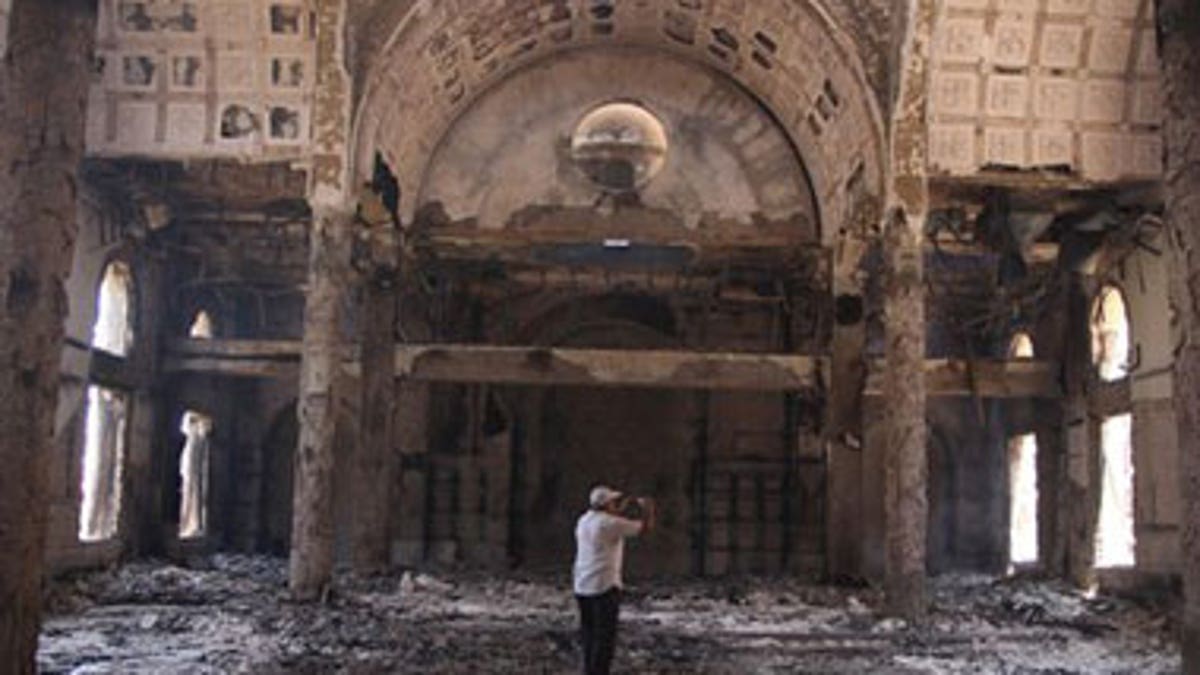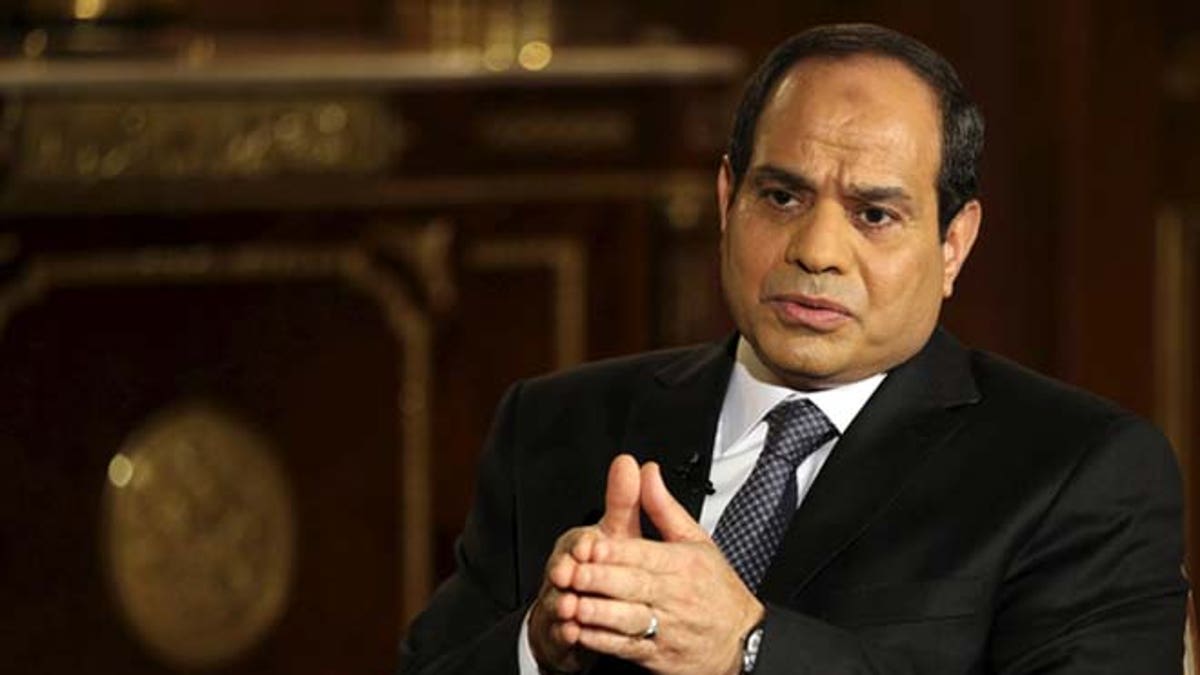
The damaged interior of the Saint Moussa Church. (Associated Press)
While scores of Churches across the Middle East are being burned, bombed and razed, at least one nation has overturned draconian laws with the goal of allowing more Christian houses of worship to be rebuilt.
The Egyptian parliament on Aug. 30 passed a long-awaited law codifying the rights of Christians to build and renovate churches in the majority Muslim country. But changing 160 years of religious subjugation at a time when sectarian violence is at a high across the region has been no smooth feat, and its effectiveness remains to be seen.

Al-Sisi is seen as a protector of his nation's Christian community. (Reuters)
“We just pray that the bill is properly reviewed and discussed by all stakeholders throughout this process,” Father Michael Sorial, priest at St. Anianus Coptic Orthodox Church in Princeton, N.J., told FoxNews.com.
In Egypt, construction of churches has been heavily regulated since 1856, when the country was under the rule of the Ottoman Empire and Christians were forced to seek approval from the sultan to build. The regulations got even stiffer in 1934, with more conditions put in place, including statutory distance requirements from Muslim shrines, mosques, schools, village canals, government facilities and railways, as well as a rule stating that neighboring Muslims must grant permission.
Typically, applications to build churches have languished in government hands for years without response, only to be eventually met with a resounding no.
But the basics of the new bill, as supported by President Abdel Fattah el-Sisi, mandate that there will no longer be a pre-condition that the president personally sign off on the building of a new church, and that just a license from the local governor would be necessary. Any building request must also be responded to within four months and each heavily populated district of the country is required to have at least one church.
While the Coptic Catholic Church has welcomed the new law, there is widespread concern that the vague wording and provisions means little will change.
According to Samuel Tadros, a senior fellow at Hudson Institute's Center for Religious Freedom and author of “Motherland Lost: The Egyptian and Coptic Quest for Modernity,” the problems are in the language of several articles, which are very vague, ambiguous and open to interpretation.
“The law ties approval of new church and its physical size to the size of the Christian community in the area. Who decides which size is adequate? One square meter per worshipper? Half a meter? Does a child get less space? The law suggests governor approval would follow consultation with ‘responsible authorities,’ but who are these?” said Tadros. “The governor is to reply within four months whether a church is approved or not. But there is no mechanism or remedy to the situation if he does not reply.”
Christians in Egypt currently make up just over 10 percent of the population. Over the past 60 years, only two churches a year have been approved, making Egypt home to about 2,600 churches in total – approximately one for every 5,500 Christians. By comparison, Egypt has a mosque for every 620 Muslims.
More than 70 of those churches have been looted, destroyed or severely damaged in bouts of sectarian violence, particularly since the Arab Spring uprisings began in 2011, although some repair efforts have been underway.
Gerard Russell, a former British and United Nations diplomat in the Middle East and author of “Heirs to Forgotten Kingdoms” which detailed the Coptic plight, called the law “a small step in right direction.”
“The [previous] law is one of several that enshrine formal inequality between Christians and Muslims,” he told FoxNews.com. “Changing it is good, but why should Christian churches be treated differently from Muslim mosques at all?”
According to some church leaders and experts, such dialogue and legal changes have come at a crucial time as violence toward the religious minority escalates.
Late last month, a knife-wielding assailant was shot and killed by a guard at a Coptic Church in Cairo following an alleged attempt to attack attendees. In July, 15 people were arrested following an arson attack on Coptic Christian homes in an Upper Egyptian village, an Orthodox nun from a Monastery in Old Cairo was shot dead by a stray bullet on a highway, and Anba Makarios, the Coptic Orthodox Archbishop of Minya, claimed that they were recording at least one designated attack on their community every 10 days.
Throughout the previous month, more Christian homes were targeted, a Christian-run kindergarten was set on fire and Coptic Orthodox priest, Rafael Moussa, was slain. In May, a 70-year-old Christian who was rumored to be the mother of a man linked romantically with a Muslim woman was marched naked through the streets by an angry horde of 300 Muslim men. In February, Islamic terrorist group ISIS claimed responsibility for the brutal beheading of 21 Egyptian Christian migrant workers in Libya.
“The construction and restoration of churches in Egypt has already for many decades been one of the most important causes of sectarian strife,” said Egyptian journalist, Girgis Gayed Hana, who is living in exile in the U.S. after threats from the Muslim Brotherhood. “Our survival has been a divine miracle so far, but we have paid for our faith in God and Savior Jesus Christ, and we are paying the price every day.”
Despite the uptick in brutality, many have praised Al-Sisi for his support of Christians since coming to power in 2013, with the latest measure a reflection of his commitment to curb Islamic-fueled rampages. He was the first ever Egyptian president to attend a Christmas Mass last year and has apologized for church attacks.
“Christians and Muslims share a common goal in Egypt and that is love for their country and its heritage,” Sorial added. “While there are some churches that have been the target of attacks over the years, our place of worship is beyond stone walls. We will continue to have a long-lasting presence in Egypt for centuries to come.”
